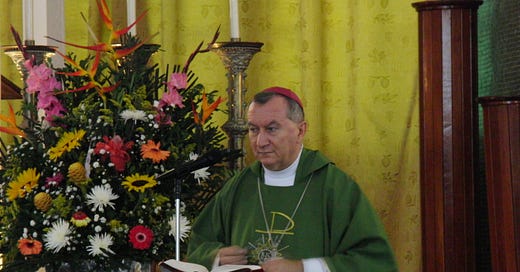Pietro Parolin is favourite for Pope, but ‘tragic’ China deal threatens his chances
‘Nice to everyone’ — and too nice to the Church’s enemies?
It feels like a grubby divination of the grand process in the conclave, but the betting markets suggest Pietro Parolin is Pope Francis’s most likely successor.
As secretary of state, the 70-year-old Italian cardinal has been the Vatican’s number two, its political and diplomatic chief, since 2013. A native of Veneto, the historically poor and pious Venetian hinterland, Parolin is seen as a centrist who made himself useful to Francis while bridging the Church’s conservative-liberal divide.
Parolin’s big advantage is his familiarity with many of the 138 elector cardinals and the emollient manner he’s deployed as secretary of state. The media often portray the conclave as a collection of cliques and factions — but for the most part it is an unwieldy agglomeration of men busy tending to their flocks across the globe, who aren’t well acquainted with each other.
“Parolin is a very safe bet because they all know him,” one Vatican insider told The Independent. “He was nice to everyone and never had conflicts with anyone.”
Yet for many in the Church, Parolin has been too nice to its enemies. His most consequential act as secretary of state was the formation of the 2018 China-Holy See Agreement. This meant the Chinese state would suggest bishops, subject to a papal veto, while taking more control over the underground Church. Meanwhile the Vatican recognised seven bishops Beijing appointed without its approval, whom it had thus excommunicated. Francis also fired a bishop in the underground Church and demoted one of his colleagues. The details of the text have been kept secret.
The agreement was a radical departure from the Church’s historic assertion of the Pope’s authority over the ecclesiastical realm and governments’ authority over secular affairs. It came amid a crackdown on Christian practice, and that of other faiths, in the officially atheist Communist state.
The revered Cardinal Joseph Zen, a former Archbishop of Hong Kong and democracy advocate there, passionately opposed the deal. Zen told Reuters: “They’re [sending] the flock into the mouths of the wolves. It’s an incredible betrayal.” He warned that “the consequences will be tragic and long lasting, not only for the church in China but for the whole church because it damages [its] credibility”.
The deal’s record suggests Zen is vindicated. Chinese authorities appointed a bishop in Shanghai diocese without Rome’s approval in 2023; a flagrant breach of the deal, which the Vatican only learned about in the media. A year later, the Vatican accused Beijing of contravening the pact when it placed a bishop of another area in southeastern China’s Jiangxi region, which the Church doesn’t recognise as a diocese.
If he succeeds Francis, there’s a big chance that Parolin’s deal with China could pave the way for greater Chinese Communist Party influence over the Catholic Church, warned Damian Thompson, one of the most prominent Anglophone Vatican watchers, noting that Beijing is “intensely interested in the outcome of the conclave”.
That’s while conservative cardinals are likely well attuned to the risk that a centrist colleague could turn against them after becoming vicar of Rome. Then Archbishop of Buenos Aires Jorge Mario Bergoglio was seen as a moderate who wouldn’t jeopardise John Paul II’s and Benedict XVI’s post-Vatican II (re)assertions of orthodoxy. After becoming Pope Francis, however, he emboldened liberal dissenters with his moves on the Eucharist for divorcés and blessings for same-sex couples. It’s reasonable to assume that many think they won’t be fooled again as they contemplate Francis’s number two — especially in light of what many see as Parolin’s betrayal of the Church in China.
Yet perhaps the biggest reason for the fragility of Parolin’s status as favourite is his status as favourite. There’s a saying in Rome that “he who enters the conclave as Pope leaves as a cardinal”. The conclave’s two previous choices, Benedict and Francis, bucked the trend. John Paul II’s longstanding right-hand-man as prefect of the Congregation for the Doctrine of the Faith, Joseph Ratzinger was always regarded as his natural successor. Francis was the runner-up in the vote that made him Benedict XVI.
This year looks ready for a reversion to the mean. It’s normal for a candidate no one expects to win the papacy — as happened in the year of the three popes, 1978. Paul VI’s death saw John Paul I’s election and fatal heart attack 35 days later amid shock that the conclave had elevated to Vicar of Christ. The world was shocked once more as Karol Wojtyla, Archbishop of Krakow, succeeded him as John Paul II, the first non-Italian Pope since Dutchman Adrian VI’s brief, crisis-racked 1522-23 reign.
Admired by non-Catholics for his courageous stand against communist tyranny in his native Poland, John Paul II stabilised the Church both doctrinally and institutionally after Vatican II and the secular social revolution later in the 1960s. A Pope of similar stature is needed now, amid crises that could escalate to the level of those bedevilling the unfortunate Adrian as the Reformation took hold. Parolin’s ill-fated deal with China suggests he is not that man.
Photo caption: Blancoduno, Wikimedia Creative Commons


